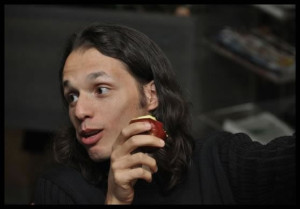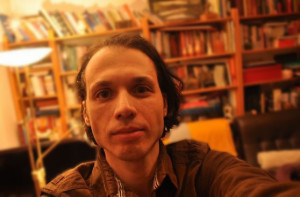…the organization has since early 2013 grown tremendously and became a much more lively and exciting place. It’s almost unrecognizable from the organization I started to work with back in 2004…

New Harvest: How did you first discover the concept of cultured meat?
Marko Vide: I first heard of the concept back in 2004 when Gaverick Matheny contacted me and asked if I would be interested in building a website for a non-profit organization he just founded and named New Harvest. Going through the website material that was being prepared this concept of cultured meat kept coming up, which is something I never heard of before and thought of as quite interesting.
Would you incorporate cultured meat into your diet?
Yes, absolutely. I would much prefer to eat cultured meat instead of meat that came from factory farms. I also think it could be of great use at difficult to access outposts such as in space, deep sea, Antarctica, etc.
My only real concern regarding cultured meat is that along with other modern methods of food production, it’s creating a growing gap between modern man and his food sources, therefore in some way contributing to further alienation between human beings and the greater natural systems around us. I think we would all treat our environment differently, if we would be made aware on daily basis that’s where our sustenance comes from.
How did you come in contact with New Harvest?
In early 2000s I’ve left my job and started an independent freelance career. As it happened a lot of my new clients were involved in vegetarian and animal rights activism. They liked my work, word got around and one day Gaverick got in touch and asked if we could do a project together. And so it began.
What changes have stood out to you in regards to New Harvest or cultured meat developments since you became involved in 2004?
As I was always involved more with the web development issues for New Harvest, I never really dived deep into the back-end research that the organization was doing over the years, so I cannot say much about that. Still, it would be hard to overlook the major changes that took place in the last two years, when Isha Datar took over the position of the executive director.
Isha brought some very exciting new energy along with a clear vision that basically completely transformed New Harvest as I knew it. Before she came on, the organization was not doing much in terms of online self-promotion and was I think more directed towards research itself.
With Isha this all changed overnight. In a very short timeframe she led the complete revamp of the website and its associated features, created a much stronger social media presence, brought in a great number of new volunteers, helped organize an editorial staff that is throwing out some very interesting articles and newsletters regularly, helped set up a growing online library and a journal club, implemented new tools that help develop researchers connect with each other, increased the donor base, set up merchandise… So much that I’ve actually lost track of it all.
Overall the organization has since early 2013 grown tremendously and became a much more lively and exciting place. It’s almost unrecognizable from the organization I started to work with back in 2004 when it often felt it was just Gaverick and me doing the online work.
Why did you begin working for social activism organizations?
Although I was involved with social activism for years, this was never really connected to my web development job and I kept the two quite separated until I started freelancing. Even then, I never really exclusively sought social activism organizations to work with. I was just sending out proposals to a great number of potential clients and requests from social activism organizations started to come in first and after that they never really stopped.
Are you a vegetarian? If so, why?
Working for years for a number of vegetarian non-profits, I was always somewhat afraid somebody was going to ask me that question. Mostly as my answer is no, I’m not a vegetarian although I experimented with various types of diets because of health issues and that included vegetarianism. But I eventually found that there are other types of diet that suit my physical constitution and helped my health problems better, so after a while I’ve settled with those.
Is there one cause that is most important to you?
The cause that is dearest to my heart is definitely environmental activism. That is something that I’ve been involved with for a long time, and it has become an essential part of my being. To paraphrase Stanislav Grof, one of my favorite authors, since we humans are primarily biological beings, it’s quite obvious that our priority as a species should be to keep our biosphere sustainable and stable enough for it to continue to support us. That means enough clean water, air, and soil to grow our food in. Without those elements it’s impossible to survive, so every other priority such as economy, profits, politics and ideologies should never be allowed to override these fundamental biological imperatives. That we are even debating such things as economy vs. global warming is sheer madness.
What is transpersonal psychology and why are you interested in it?
Transpersonal psychology is a fourth force in psychology (next to psychoanalysis, behaviorism and humanistic psychology) that sees human beings not just as biological machines whose consciousness starts and birth and ends at death, but as much more complex beings who also have an important spiritual component to them. In its understanding of human psyche it attempts to integrate modern Western psychology with more ancient Eastern psychologies into a single contemporary school of thought. An important aspect of its thinking is also the recognition that non-ordinary states of awareness can be useful and healing, instead of just pathologizing them, which unfortunately is what psychiatry and more mainstream psychology often does.

What would you like to do with your psychotherapy degree once you have graduated?
Honestly, I’m not sure. Although I’m quite fascinated with psychology I thought of my formal studies more of a sideline project and not as a serious job prospect. That might change down the line or if a nice scholarship comes along that would enable me to upgrade it, but for now I’ll just put it in a nice frame and put it on a wall.
What new technology are you looking forward to becoming a reality in your lifetime?
I think that humanity has already developed enough amazing technologies that can enable it to solve most of our most difficult predicaments and create a much better world for itself and the beings we share this planet with. So I’m not actually looking forward to any new technology to become reality, but would much prefer to see humanity transform the way it thinks and sees itself and the world around itself and the direction we apply our existing technologies towards.
That we’re globally spending $1.5 trillion a year on weapons (“tools used to blow each other up”) is just mad. Think of what that money could do if invested in tools used to actually build something and improve our lives. Things like medicine, food, shelter, education, renewable energy sources.
Of course that won’t happen as long we keep fearing each other, find greed, selfishness and competition as something natural and normal and as long as we continue to strive to control everything and everybody around us. I think that any kind of new technological innovation, without adjoined inner transformation of humanity won’t radically improve the world we live in, so the latter is something I would actually love see happening in my lifetime.
Thanks Marko, it was great to learn more about you and your point of view!

